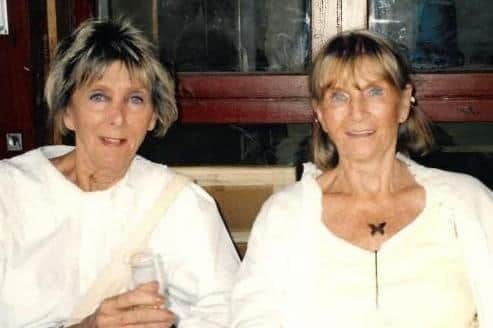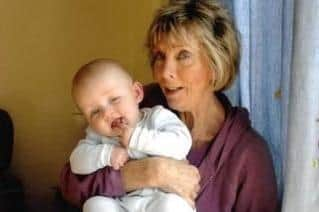'It wasn't the death she deserved': Northampton man backs assisted dying law after terminally ill mum takes her own life
and live on Freeview channel 276
A Northampton man, who was questioned by police after his mum’s death, is speaking out in support of the legalisation of assisted dying, as debate progresses in the House of Lords, Holyrood, the States Assembly of Jersey and Ireland’s Oireachtas.
Adam Wellesley's 83-year-old mum, Vicky Wellesley, took her own life in 2018 after a terminal metastatic cancer diagnosis. Vicky, from Pitsford, had lived with breast cancer for 17 years, which later spread to her bones.
Advertisement
Hide AdAdvertisement
Hide AdVicky knew a death from bone cancer could be very painful and wanted instead to die on her own terms. She researched travelling to Dignitas in Switzerland, where assisted dying is legal under certain circumstances for foreign nationals, but she was too ill to make the journey.


Following their mother's death, Adam, 54, and his sister Kate were questioned by police after evidence was found that they had researched Dignitas at their mum’s request.
Under the 1961 Suicide Act, anyone in England and Wales who helps another person take their own life could face a maximum jail term of 14 years.
Adam said: “I’m glad mum didn’t have to suffer even more through the last stages of her illness, but it wasn’t the death she deserved.
Advertisement
Hide AdAdvertisement
Hide Ad“Being interviewed by the police so soon after losing our mum was very stressful. They took my phone but later we found out the case had been dropped as it wasn’t in the public interest to prosecute us."


Adam has contributed to a new report from the Dignity in Dying campaign, entitled 'Last Resort: The hidden truth about how dying people take their own lives in the UK'.
It estimates that - under the ban on assisted dying - up to 650 dying citizens take their own lives every year, with up to 6500 attempting to do so. This is in addition to 50 Brits a year who travel to Switzerland for an assisted death and 17 a day who suffer in pain as they die despite palliative care.
Polling released as part of the report reveals that seven in 10 Brits believe there is a distinction between assisted dying and suicide, and seven in 10 feel suicide prevention measures should not stop terminally ill people seeking assisted death.
Advertisement
Hide AdAdvertisement
Hide AdAdam continued: “If mum had been able to have an assisted death, not only would we have been spared the pain of being questioned by police, she would have got to die in the way she so wanted, out of pain and without worrying about the legal implications for us.
“Terminally ill people live longer and happier lives. Changing the law would give them the peace of mind that, if there’s a point in time their pain becomes unbearable, they can end their lives, on their own terms and with dignity.”
MP Andrew Mitchell, co-chair of the All-Party Parliamentary Group on Choice at the End of life, spoke in an adjournment debate in the House of Commons last week calling for a clear process of reform of assisted dying laws in England and Wales. This debate followed the progress on assisted dying debates in Scotland, Jersey and Republic of Ireland.
In October, an Assisted Dying Bill brought by Dignity in Dying’s chair, crossbench peer Baroness Meacher, passed its Second Reading unopposed in the House of Lords. The Bill proposes that terminally ill, mentally competent adults who have been given six months or less to live should have the choice of a safe, legal assisted death, subject to strict safeguards.
Advertisement
Hide AdAdvertisement
Hide AdChief executive of Dignity in Dying, Sarah Wootton, said: “Denied the safe, legal choice they want in this country – with Dignitas only open to those with the funds or strength to travel – hundreds of terminally ill people every year are resorting to taking their own lives in violent and extreme ways, leaving untold devastation for loved ones, local communities and first responders.
“In Westminster opponents of Baroness Meacher’s Assisted Dying Bill – which the British public is united in support of – have tabled nearly 200 amendments. The majority are designed not to protect dying people but to scaremonger, polarise and run down the clock. They betray the underhanded motivations of a hardline minority of opponents: not to improve the Bill but instead to wreck it by any means.
“This Bill represents a safer, fairer, more compassionate response to the desire of many terminally ill citizens for greater choice at the end of their lives, providing comfort and helping to prevent the horrific deaths. We need a clear process in Westminster reforming the outdated status quo, with proper time set aside for this crucial debate.”
The police and crime commissioner for Northamptonshire, Stephen Mold, wrote to the Justice Secretary in October 2020 following Vicky Wellesley's case, in support of the Dignity in Dying campaign. He was joined by 17 other Police and Crime Commissioners to express their 'misgivings' with the current law on assisted dying.
Advertisement
Hide AdAdvertisement
Hide AdStephen Mold said the law 'has undeniably caused distress, confusion and pain for terminally ill people, their loved ones and even the investigating police officers themselves.'
He added: “We are concerned that current legislation merely drives assisted deaths overseas or underground, that it does not offer adequate protection to potentially vulnerable people, and that it is near-impossible to enforce in most cases."
Despite support for an Assisted Dying Bill, there are some who believe it would be wrong to pass the law.
Dr Gordon Macdonald, chief executive of Care Not Killing, said: “Changing the law to legalise assisted suicide and euthanasia in the UK would represent a dramatic change in how doctors and nurses treat and care for people.
Advertisement
Hide AdAdvertisement
Hide Ad"It would also place huge pressure, real or perceived on terminally ill and disabled people to end their lives exactly as we see in the handful of places that have legalised assisted suicide or euthanasia.
“It is disappointing at time when we have seen widespread discrimination against the elderly and disabled people, along with a crisis in the NHS and care system that we continue to ignore the more important debate of how to extend high quality palliative care to all those who need it.”
Samaritans can be contacted on 116 123, or via email [email protected].
Comment Guidelines
National World encourages reader discussion on our stories. User feedback, insights and back-and-forth exchanges add a rich layer of context to reporting. Please review our Community Guidelines before commenting.